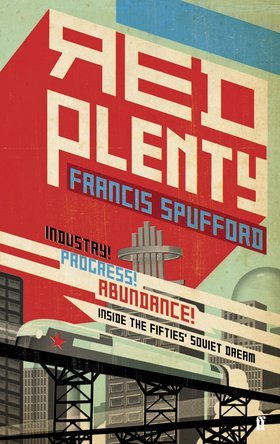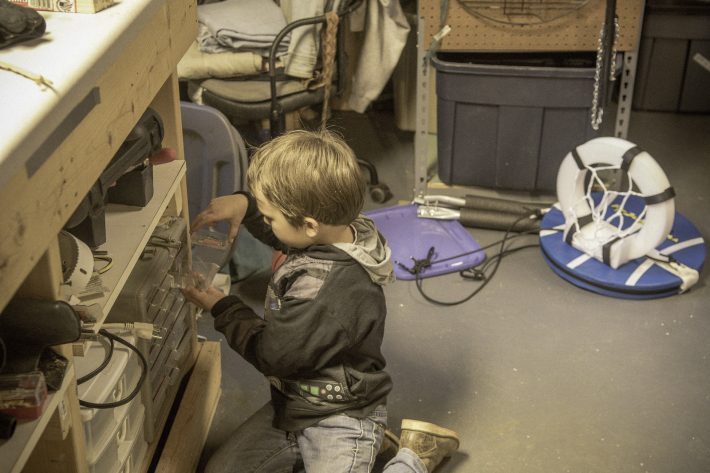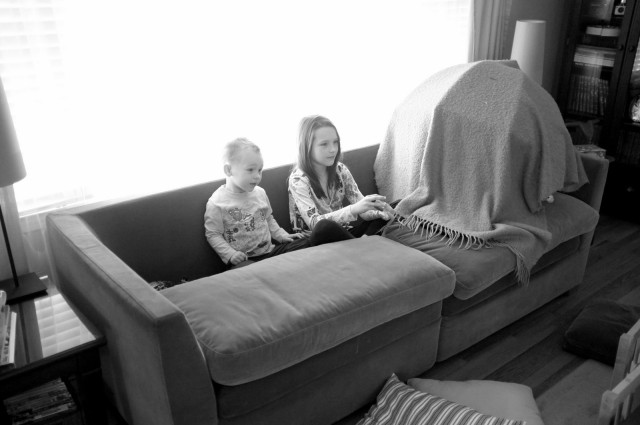I went into the teachers’ workroom to make a coffee. It was the first day back, and some teachers had brought their kids with them. When I opened the door, I found three energetic children playing with balloons.
“Do you want to see what we’re doing?” a small blonde girl asked, her ringleted hair bouncing with excitement.
“Of course I do,” I said.
She grabbed a balloon, puffed out her cheeks, and forced air into it with all her might until it inflated just a little. Then she opened her mouth. The blue balloon shot across the room, and she erupted—squealing, jumping, delighted. She chased it down and did it again.
I smiled and walked away. Hearing her repeat it a third time, I felt unexpectedly envious.
It was such a simple act, yet it held her completely. Children can endow the smallest things with meaning, with such intensity that repetition never dulls the pleasure. Each time is new—better, even.
Fifteen or twenty minutes later, when I went back downstairs to get pork for my lunch, the kids were still there, still playing with the balloons, still just as excited.
When did we lose that kind of wonder? Why do childish pleasures cease to be adult ones? As a fifty-three-year-old, I find nothing remotely appealing about blowing up a balloon and letting it fly away. I wouldn’t do it once, let alone again and again. If I did it at all, it would be to entertain children—and even then, my pleasure would be borrowed, derivative of theirs. Otherwise, it would feel like a chore, something to check off before a birthday party. And knowing I could pay someone else to do it, I probably would.
Children don’t outsource joy. They might share it, but even that has to be taught. Their pleasures are closely held.
What, then, are mine?
I don’t think I have many. Most of what I enjoy I’m happy to share—or no one else wants. I’m the only one in my family who likes whiskey. I’ll offer a puff of my cigar, though I know my wife won’t take it. And what pleasures I do have, I pass easily to my children.
Just before Christmas break, I came home with small treasures from my students and gave most of them away. Lena claimed the Starbucks cards. Both kids went for the candy. Ginger took the restaurant gift cards and tucked them away for busy weekends. I let them—all of it—without hesitation.
That ease, too, is a kind of privilege.
It must be a particular first-world luxury to carve out moments so carefree that our troubles dissolve into the fog during an evening walk. We have worries, yes, but nothing dire. Poverty is distant, almost unthinkable. We do not worry about our next meal.
And yet, how quickly could it all unravel? How quickly could democracy slide into chaos? How fast could our civilization collapse and leave us worse off than before? We like to imagine that people in poorer parts of the world know how to survive with less, that hunter-gatherers endured without any of the technologies we now depend on.
The preppers who populate my social media feeds—once you watch one, the algorithm supplies the rest—are convinced collapse is imminent. They warn us where not to go, what to stockpile, how to survive martial law and total disorder. But can anyone live a fulfilled life while obsessing over collapse? To call oneself a prepper seems to require abandoning nearly every other concern.
Perhaps that is the core of first-world nonchalance. We live in a world that feels inevitable, permanent, destined. Even its collapse is hard to imagine. To suggest that food might one day be hard to get—or that entertainment might disappear—feels as absurd as waking up without arms or legs. We are too accustomed to having the world at our fingertips, carried in the microcomputers we casually call phones.
So what do we make of first-world luxury? Of privilege? Of the innocence of childhood?
I see it in small rituals: walking the dog at night, schedules snapping back into place, students lining the halls—eager, a little sad that break is over. The Christmas decorations came down at school today. Our own sad little tree will linger until the weekend, or until my mid-January birthday passes, and then it too will be gone. Another Christmas season ended.
And yet each one seems to close with more uncertainty than the last. Political turmoil deepens. Environmental collapse feels less abstract. There is a troubling naivety—perhaps even selfishness—in those who greet this with confidence that, before it gets too bad, salvation will arrive.
A new year. Another war. New threats of evil.
And still, we go about our business.
What else could we do?


























